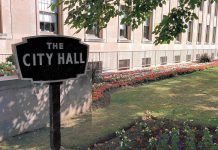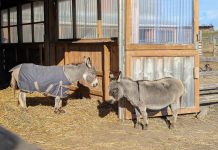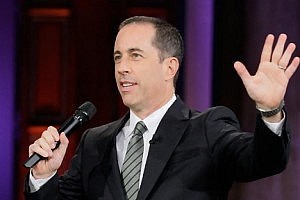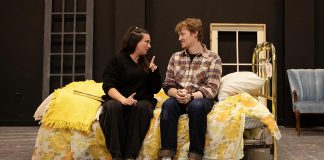It was big news last fall when we found out that iconic comedian Jerry Seinfeld was coming to Peterborough in April to do his stand-up routine.
You’d think he’d be tired of doing stand-up after 40 years of being a comedian (Jerry turns 60 on April 29, three days after his appearance in Peterborough).
He certainly isn’t doing it for the money — Jerry is worth over $800 million, making at least $32 million a year (largely syndication revenue from his perpetually popular Seinfeld TV show), and he reportedly owns a private jet and more than 40 vintage Porsches.
He’s still doing stand-up because he loves performing. In fact, after Seinfeld ended, Jerry was happy to return to stand-up comedy because he found it so grounding — as he explained on a recent “Ask Me Anything” (AMA) on Reddit.com.
“There’s no faking stand-up,” he says. “There’s no coddling in stand-up. There’s no preciousness in stand-up.”
As an example, Jerry remembers performing at Governor’s in Levittown, New York at the height of Seinfeld mania. The club owner came into his dressing room before the show and said he needed Jerry to be offstage by 9:15 p.m.
“It was a big deal that I would come to that small club, but the owner of the club just treated me the same as everybody else,” Jerry recalls. “That’s why I wanted to go back into doing stand-up comedy. As the star of your own TV show, you don’t get treated like that — but as a stand-up performer you do get treated like that. Stand-up is a life of brutal reality, which is the opposite of the life I had been leading in L.A.”
Since 2000, Jerry has spent a portion of nearly every week doing stand-up. In 2012, he did 89 public shows, as well as private appearances, averaging two performances a week.
Born in 1954 and raised on Long Island in a “pretty Jewish” family, Jerry dreamed of going into advertising. Growing up, he listened to radio personality Jean “Shep” Shepherd, along with comedians Bill Cosby and Robert Klein. His favourite sitcoms as a kid were Get Smart, Laugh-In, and Batman. Jerry eventually chose comedy as a career because he thought “it would be easier and more fun than real work”. In the end, it turned to be much harder than he thought.
“But you still don’t have to ever really grow up,” he says. “That’s the best thing of all.”
Unlike many modern comedians, Jerry eschews obscenity and edginess in his act — something he has avoided for his entire career.
“When I started out in comedy in the ’70s, if you didn’t do clean humour you weren’t getting on TV,” he explains. “I started doing it so I could be on The Tonight Show with Johnny Carson. Then I saw what other people were doing, but I just always wanted to be a little different.”
Perhaps this is one reason why he — along with fellow comedian Larry David — was able to convince NBC in 1988 to produce a show about how a stand-up comedian gets his material.
Contrary to Seinfeld mythology, Jerry and Larry never pitched it to NBC executives as “a show about nothing”. That was just a joke they wrote into the 1992 “origin story” episode called “The Pitch”.
“To this day, Larry and I are surprised that it caught on as a way that people still describe the show,” Jerry says. “To us, it was the opposite of that.”
Considering the impact Seinfeld has had on the pop-culture landscape, it truly isn’t a show about nothing. There’s a website run by academic economists called The Economics of Seinfeld. There are dozens of Seinfeld tribute Twitter accounts, like @SeinfeldToday and @Seinfeld2000 (Peterborough has its own account, @PtboSeinfeld). There’s even an anthology of scholarly essays on philosophy that includes such intriguing entries as “The Jerry Problem and the Socratic Problem” and “George’s Failed Zest for Happiness: An Aristotelian Analysis”.
Then there’s the famous faux holiday Festivus — with its “Feats of Strength” and “Airing of Grievances” — that’s become an annual secular celebration for some people. Festivus is an actual day that was invented in 1966. Dan O’Keefe, an editor for Reader’s Digest, created it to mark the anniversary of his first date with his future wife. As it turns out, O’Keefe’s son became a writer on Seinfeld and wrote Festivus (with a few modifications) into “The Strike” episode.
Everyone, including Jerry, has their favourite Seinfeld episodes. Jerry’s favourites are “The Rye” and “The Pothole”.
The plot of “The Rye” involves the appearance and disappearance of a loaf of marbled rye bread (including Jerry mugging a stubborn old lady for her rye), causing repercussions that last until the very end of the plot. That episode had special significance for Jerry and co-creator Larry David.
“We got to shoot that episode outdoors at the Paramount Studios set in Los Angelas, which was the first time that we thought ‘Wow, this is almost like a real TV show!'” Jerry says. “We hadn’t felt like a real TV show, as the early years of the show were not successful.”
“The Pothole” involves (among other things) Kramer repainting the lines of a four-lane highway to create two extra-wide lanes, and later using paint thinner to remove the lines. In the final scene, Newman drives his mail truck over a sewing machine, which gets caught under the truck and sparks into flames when the truck encounters Kramer’s solvent.
“It was really fun to shoot, and it was fun to set Newman on fire,” Jerry says. “He screamed ‘Oh, the humanity!’ like from the Hindenberg disaster. It’s one of my favourites.”
Newman (played by Wayne Knight) is also Jerry’s favourite supporting character on Seinfeld.
“When I got to have a real evil nemesis like Superman would have, that was a dream come true for me,” Jerry recalls. “There’s no superhero that doesn’t have an evil nemesis, and I got to have one. I love that nobody ever asked ‘Why didn’t you like Newman?’ No one ever asks me that, and no one ever questions it. There was no reason I didn’t like Newman — it was just fun.”
It’s been almost 16 years since Seinfeld ended with a two-part finale. Some criticized the finale for portraying the main characters as bad people with no respect for society and for mocking the audience who tuned in to watch them every week, but Jerry has no regrets.

Jerry remains friends with his Seinfeld co-stars (Julia Louis-Dreyfus, Jason Alexander, and Michael Richards) and sees them regularly.
“Working with the cast was pure heaven for me,” Jerry says. “We were as well suited to each other — as it seems when you watch the show. We enjoyed each other’s company enormously. I think that was one of the big things that made the show work.”
When asked how he feels about those many Twitter accounts that imagine a modern-day Seinfeld, Jerry explains that he doesn’t find them very amusing — in fact, he finds them very painful.
“Over the nine years of doing the show, Larry David and I sat through hundreds of ideas that people wanted to do on the show,” he says. “Most of the ideas were not good. Somebody recently asked Larry the same question and he said ‘I know you think it’s funny, but it’s really hard.’ The ideas that Larry and I would come up with needed to be very unique, and it’s a lot harder than it seems.”
A case in point is the never-aired episode where Jerry bought a handgun.
“We started making it and stopped in the middle,” he says. “We did the read-through and then cancelled it. Trying to make that funny ended up being no fun.”
Nowadays, on a typical workday, Jerry walks or bikes to his work space in the Upper West Side of New York, where he spends most of the time writing and refining his jokes. In addition to his immense success, he’s also now a family man: he and his wife Jessica have a 13-year-old daughter and two sons aged 10 and 8.
“The only line I quote from the show is ‘If you’re one of us, you’ll take a bite'”, he says, referring to “The Pie” episode where George is at a lunch with new work colleagues and refuses (for good reason) to take a bite of pie. “A lot of times the kids won’t want to try certain foods, so I’ll use that line.”
Jerry says that he plans to continue performing stand-up as long as he can, “into my 80s, and beyond.” On the question of what he would do if he weren’t performing stand-up, he has a one-word answer: “Die.”
He dismisses the suggestion that audiences laugh during his stand-up shows these days simply because he’s Jerry Seinfeld.
“Nobody laughs at a reputation,” he says. “They get excited in the beginning, but they can’t lie to me. They cannot lie to me. I’m going to find out.”



























